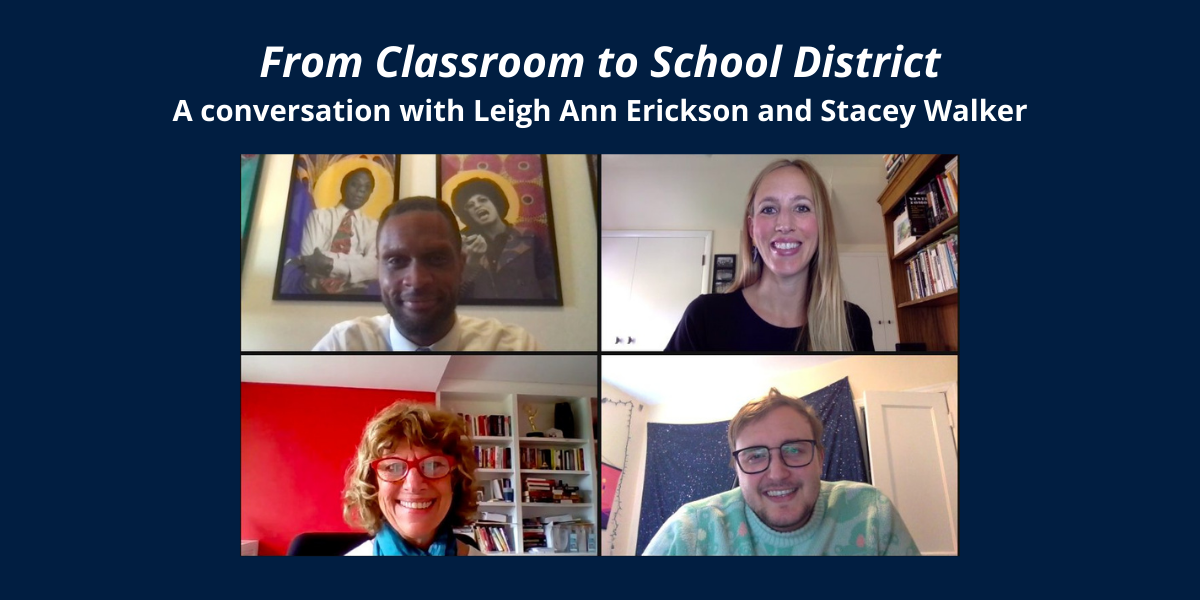From Classroom to School District: Creating Systemic Change

Posted in News Story
On April 29th, the Center for Public and Nonprofit Leadership and the McCourt Education Policy Initiative hosted Leigh Ann Erickson and Stacey Walker for a conversation on race, bias and education reform. Leigh Ann Erickson is the founder and principal of Undone Consulting, and Stacey Walker is an activist and county supervisor in Cedar, Rapids Iowa.
Dr. Kathy Kretman, Director of the Center for Public and Nonprofit Leadership and Waldemar A. Nielsen Chair in Philanthropy at the McCourt School of Public Policy, welcomed students, faculty, and nonprofit leaders. Kathy introduced the discussion by saying, “I know that conversations about race, racism, and bias are hard. But I believe it is an educator’s responsibility, kindergarten through higher education, to intentionally enable our students to have what Leigh Ann Erickson calls the relationship building conversation. One day, these conversations will become a common expectation and a common experience across the education system.”
You can view a video of the event here: https://vimeo.com/544663914/0cfb81012d
During the event, Erickson and Walker discussed many of the issues surrounding racial equity in the US educational system, including:
- Gaps in education as it relates to race
- The importance of learning and reflecting on these issues
- Being grounded in the communities where you are working
- The power of education to shape the next generation of future leaders
- Schools are one of the frontlines for equity and justice
- Training teachers with trauma informed practices
- Working to close the belonging gap, and desegregating the educational experience for all students
- The importance of policy reform
- Personal responsibility
Leigh Ann discussed how gaps in education lead to bias, which can impact the way we teach. She noted, “when I think of gaps in education as it relates to race, I can say that I learned about slavery but not the rich history of Africa. I learned about the war on drugs, but not the plague of Mass Incarceration. That bias that I carried directly affected my effectiveness as a teacher. We all need to take part in learning and reflecting. But we also must act, so I want to encourage that learning.”
Stacey also provided students with an important call to action. While learning and reflecting is the first step, it all leads to action. Taking action is what will create lasting and sustainable change. When reflecting on his career in politics and his personal experiences with education, he emphasized the importance of action. “Policy matters. We need to focus on what is good, what is fair, just, and equitable. And we have to have the courage to not only speak on those things, but to act; knowing full well that sometimes when we choose to act, you will undoubtedly lose friends, you may lose political or social capital…In my political career, my actions may have caused me to lose some political and social mobility. But if it all ended for me tomorrow, I would be immensely proud of the work we have done, all because we had the courage to speak truth to power and take action.”
During the presentation, Leigh Ann provided a list of her books, articles, and videos as resources for attendees:
- What is White Privilege, Middle Grade Book about white privilege, Cherry Hill Publishing
- Classroom Conversations on Injustice and Oppression, Iowa Public Radio Segment
- “On Anger and Equity”, Article from Culture Feed
- “Making it Personal: White Educator Resistance”, Undone Consulting article – Erickson
- In Character, A Conversation on Equity, Article from Culture Feed
- Raising the Creating Social Justice Curriculum in Predominantly White Schools, a Webinar, National Network of State Teachers of the Year
- “9 Tips for Helping your Students Become Activists”, EdPost Article
- “White Students Can Fight For Racial Justice If Given the Tools” EdPost Article
She also shared resources from others working in the field:
- Miseducation | ProPublica – Civil rights data released by the US Department of Education revealing racial inequity in school districts across the country
- If I Could: Lessons for Navigating an Unjust World by Kelisa Wing – Pre-order Kelisa Wings new article which outlines strategies to teach children of color in America
- Center for Black Educator Development – An organization dedicated to developing highly-effective Black & fellow educators who incorporate Black culture & fight for justice through revolutionary education
- Sharif El Mekki Twitter – Sharif is an activist and the founder of the Center for Black Educator Development
- The Core Collaborative: Education – A educational network that specializes in collaborative, learner-centered holistic practices
